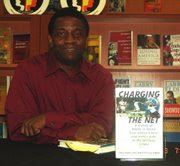

Sports are not exempt from racial profiling. While the racial profiling in sportsworld is not as extreme or humiliating as that which exists in America’s airports and on the roads, it is mindless and infuriating nonetheless.
My skin crawled while watching an NBC Sports promo for this Sunday’s Patriots-Steelers football game. As NBC showed film of New England Patriots coach Bill Belichick (right), a voiceover announcer intoned, “the master mind.” Then we saw film of Pittsburgh Steelers coach Mike Tomlin (left) as the announcer said, “versus the master motivator.”
Both Belichick and Tomlin are Super Bowl-winning coaches. Belichick is white. Tomlin is black.
Why isn’t Tomlin credited with having a fine football mind? Why do media observers ascribe Tomlin’s success to an ability to give a fiery speech? Why are Tomlin and other black NFL playoff coaches past and present—men such as Tony Dungy, Herman Edwards and Dennis Green—reduced to mere “motivators”?
Racial profiling.
Before Tomlin became Pittsburgh’s head coach, he was the Minnesota Vikings’ defensive coordinator. Every week, he spent many hours breaking down film footage to develop game plans that included coverage and blitzing schemes designed to thwart an opposing offense.
Heady stuff. And Tomlin did it very well. The Vikings had the NFL’s top-rated defense during his tenure. And his work as Steelers coach has been so exemplary that no one believes Pittsburgh misses Bill Cowher.
Yet NBC could not bring itself to promote Patriots vs. Steelers as a battle of coaching masterminds.
Experience shows that both Super Bowl-winning coaches have to be white for that to happen.
Remember when Eric Mangini led the Jets to the playoffs in his first year as an NFL coach?
“Man-genius,” he was called. Or just “genius”? That is, until the Jets fired him after the 2008 season.
Did Mangini get dumb? Or was he never a “genius” in the first place, but rather the beneficiary of media hyperbole given to a successful white coach by a predominantly white sports media?
Mangini used to be the NFL’s youngest head coach. Raheem Morris is the NFL’s youngest head coach now.
Morris’s Tampa Bay Buccaneers are 5-3. Have you heard anyone call Morris a “genius” for turning around the previously woebegone Bucs? And you won’t hear it, even if the Bucs make the playoffs.
Racial profiling.
And it’s hardly limited to football.
On October 22, the night the Texas Rangers vanquished the New York Yankees in the American League Championship Series, former big-league catcher turned TV commentator John Flaherty said this about Texas manager Ron Washington: “He’s not the best Xs and Os guy in the world, but he gets his players to play hard.”
Flaherty, who works for the Yankees Entertainment and Sports Network, would have us believe all Washington does is motivate. The fact is Washington out-managed Yankees skipper Joe Girardi so severely that, if not for a late Yankees’ rally in Game 1, Texas could have swept the best-of-seven series.
The list of baseball managers whose success has been attributed to an ability to motivate rather than an ability to strategize and make smart in-game decisions includes Washington, Dusty Baker and two-time World Series winner Cito Gaston.
Not surprisingly, all three are black.
A generation ago, we heard and read that successful black athletes were “natural athletes” while successful white athletes were “smart” and “brainy” and “savvy.”
Some older commentators still engage in this kind of racial profiling. (Pay close attention to Bill Raftery’s work on ESPN’s and CBS’s college basketball telecasts, particularly when he talks about point guards.)
Fortunately, most people who get paid to comment on sports have become enlightened enough to drop the “natural athlete” references or the stereotype that light skin = smart and dark skin = physical.
Alas, we still have to smarten up the ones who routinely subject black coaches and managers to racial stereotypes.




